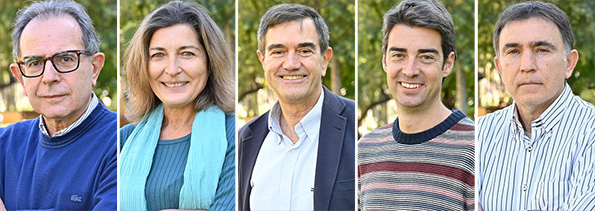Five world leaders
Avelino Corma, Amparo Chiralt, Hermenegildo García, Luis Guanter and Pedro Luis Rodríguez are, for yet another year, among the most influential researchers in the world in their respective fields, according to the HCR list 2021
[ 22/11/2021 ]
Avelino Corma, Amparo Chiralt, Hermenegildo García, Luis Guanter and Pedro Luis Rodríguez all share one passion: science; one place, the Universitat Politècnica de València; and one result: excellence. This is why they are, for yet another year, among the world’s most influential researchers in their respective areas of knowledge, as the latest edition of the Highly Cited Researchers (HCR) list, which has been published today, shows. Every year, the HCR list features the most internationally cited scientists.
Avelino Corma, a research professor at the Spanish National Research Council (CSIC), and Hermenegildo García, a professor at the UPV –both of them researchers at the Institute of Chemical Technology (ITQ, UPV-CSIC)– are two of the world’s most influential researchers in the field of chemistry. Amparo Chiralt is a researcher at the Institute of Food Engineering for Development (IUIAD-UPV) and excels in agricultural sciences, whereas Luis Guanter, a researcher at the Institute of Water and Environmental Engineering (IIAMA), is outstanding in the field of Earth Sciences (or Geosciences). Finally, Pedro Luis Rodríguez is a CSIC research professor at the Institute of Molecular and Cellular Biology of Plants (UPV-CSIC) –and an international leader in the area of plant biology.
Once again, the UPV is the only Spanish polytechnic university featured in this ranking, prepared by Clarivate.
The 8th edition of the HCR list features 6,602 researchers, from more than 70 countries, who stand out for the excellence of their contributions to scientific knowledge and the influence that they have in their respective areas of expertise. By country, the ranking is led by the United States, which is home to 2,622 of the world’s most influential researchers. The US is followed by China (935) and the United Kingdom (492). Spain, home to 109 of the list’s scientists, ranks 9th –up one place from last year.
The methodology that determines the who’s who of the world’s most influential researchers is based on data collected and analyses conducted by expert bibliometricians and data scientists at Clarivate’s Institute for Scientific Information™.
"Science needs stable funding, it cannot depend on the government of the day"
When asked about the situation of science in Spain, all five UPV researchers agree that the pandemic has made society more aware of the importance of research, "although it has also shown which the leading countries are when it comes to solving pressing problems. Unfortunately, Spain is not among them," says Hermenegildo García.
In order to reverse this situation, all of them point to the need for more funding, and for the country to commit to science "once and for all". "I think we need more investment and better coordination in the system, through effective dialogue between its different agents and the scientific community. We must turn our gaze to those countries that present the best results in terms of transfer to society. We also need greater investment in basic science, and policies and tools that facilitate transfer," says Amparo Chiralt.
In Avelino Corma’s view, "it is urgent for science to have stable funding, and for researchers to be able to have a career path with clear and well-defined rules –rules that do not depend on the governments managing R&D in each legislature". Rodríguez also demands a firm commitment to maintain investment in science, "beyond the current temporary situation, caused by the pandemic". To these demands, Guanter adds one more: mobility between institutions should be promoted, especially at the national level.
The best of the Spanish scientific system is the people working in it... but science is a long-distance race
The research staff is, in fact, the main asset of the Spanish scientific-technological system. "The talent and dedication of researchers is the best that our science has to offer," says Pedro Rodríguez. "They are our country’s main strength. This is why we should be working more effectively to attract more human resources to research. This is an urgent matter, as many researchers have been forced to leave the country in order to make a living," says Amparo Chiralt.
Finally, regarding future researchers, the thoughts of the five of them are unanimous too: science is a long-distance race, and it requires a lot of dedication and mobility. "They should enjoy this race; they must never get discouraged, and they have to believe that a career in research is possible and worthwhile, because it is very rewarding in the end. They should try to develop their own ideas and projects from the postdoctoral phase onwards, and it is better if they carry on this phase in a different group from the one that supervised their PhD", they conclude.
Outstanding news
 ARWU 2023
ARWU 2023
The Shanghai ranking reaffirms the UPV as the best polytechnic in Spain for yet another year
 Science Meets Regions CV 2023
Science Meets Regions CV 2023
The UPV and the Almussafes City Council begin a collaboration in search of solutions to maintain the automobile sector in the Valencia Region
 Scientific reference
Scientific reference
Avelino Corma, Distinguished Research Assistant at the UPV, awarded an Honorary Doctorate by the University of Huelva
 Micronanofabs NTC UPV-PERTE CHIP Conference
Micronanofabs NTC UPV-PERTE CHIP Conference
María Marced, TSMC Europe president: "The sector's future is bright, the market is expected to double by 2030"
 Goya nomination
Goya nomination
Javier Polo, who holds a degree in Audiovisual Communication from the UPV, directs the successful short documentary Una terapia de mierda
 Sant Carles Medal 2023
Sant Carles Medal 2023
The Faculty of Fine Arts of the UPV awards the Sant Carles Medal 2023 to outstanding Valencian art and culture figures







